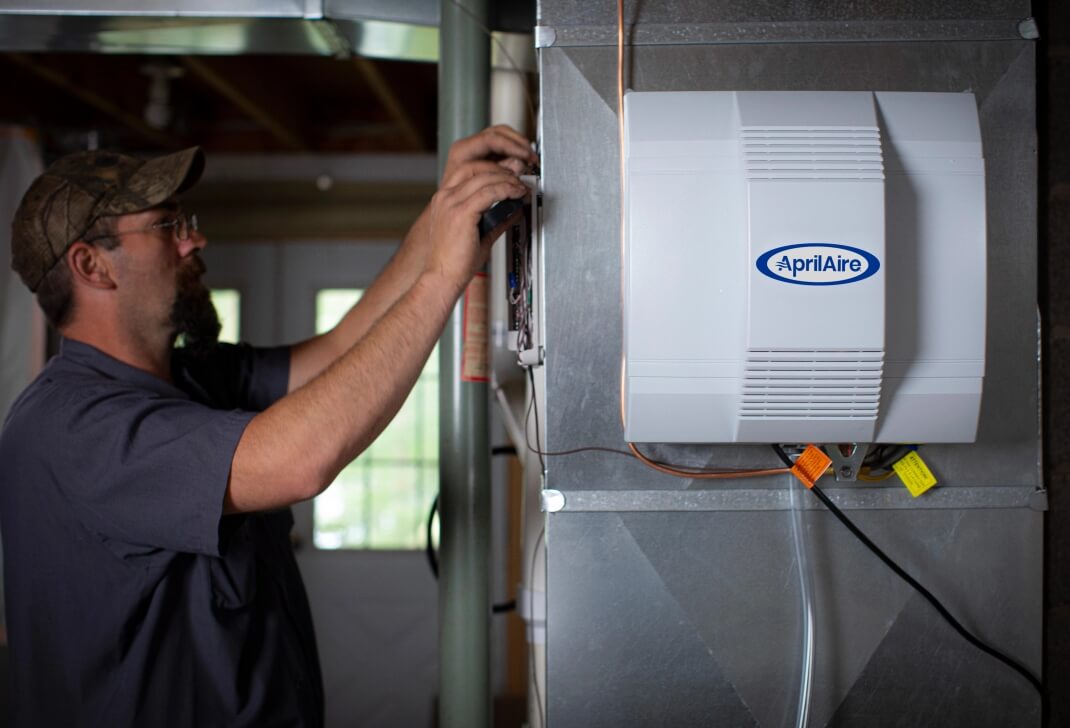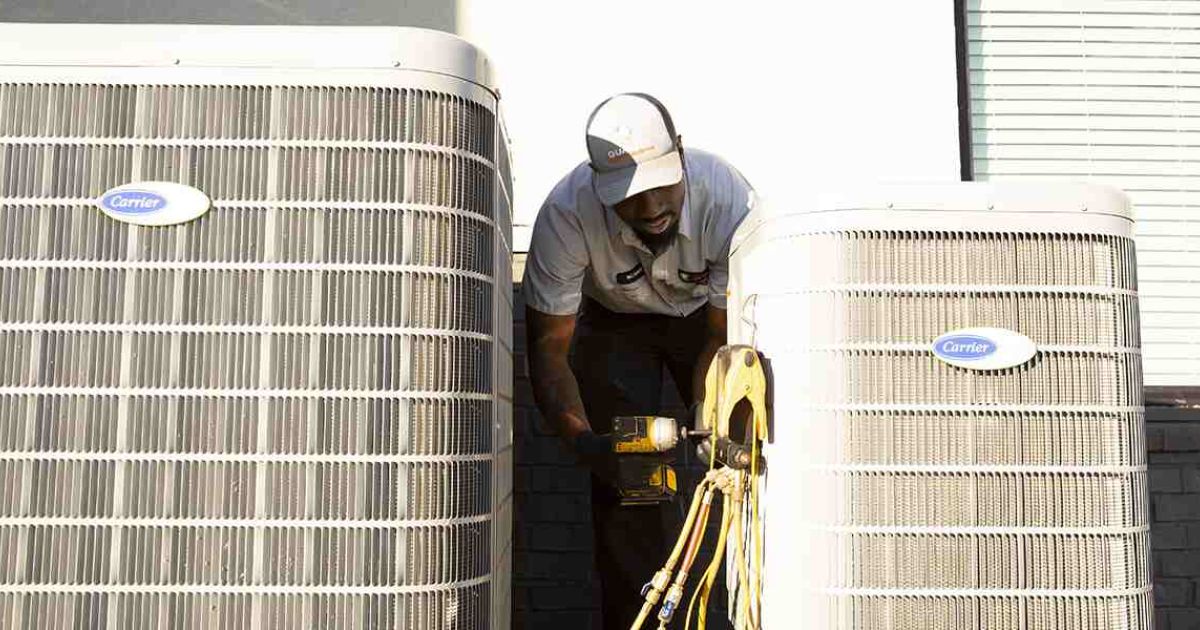Commercial HVAC Contractor Offering Professional Heating & Cooling Solutions
Wiki Article
A Comprehensive Take A Look At Cooling And Heating Providers and Their Effect on Energy Performance and Cost Cost Savings
With technical improvements like wise thermostats and high-efficiency parts, the possibility for optimizing system efficiency is vast. As we explore the intricate relationship between Heating and cooling systems and operational costs, consisting of the shift towards environmentally pleasant options, the inquiry emerges: exactly how can these methods be successfully applied to make the most of both economic and environmental advantages?
Value of Cooling And Heating Systems
a/c systems are a vital part of contemporary structures, playing an important function in maintaining healthy and comfortable indoor settings. These systems, incorporating air, air flow, and home heating conditioning, are necessary for controling temperature, humidity, and air top quality, thereby guaranteeing the well-being of passengers. Efficient heating and cooling systems contribute dramatically to developing an ideal indoor environment, which is vital for both property and commercial spaces.In commercial structures, cooling and heating systems are important to offering a effective and risk-free environment. By regulating indoor environment conditions, these systems aid stop the development of mold and the spread of air-borne contaminants, thus guarding the health and wellness of workers and consumers. Furthermore, in residential settings, cooling and heating systems boost living problems by offering constant thermal comfort and enhancing interior air top quality, which is crucial for overall health and wellness.
Moreover, the style and maintenance of cooling and heating systems have a direct effect on power consumption and operational prices. Appropriately made and maintained systems can dramatically reduce energy usage, bring about reduced energy costs and a smaller sized carbon footprint. The effectiveness of these systems hence plays an essential duty in advertising sustainability and energy preservation within structures, highlighting their relevance in the contemporary architectural landscape.
Developments in Cooling And Heating Technology
Advancement in heating and cooling innovation is reinventing the means structures take care of interior environments, introducing a brand-new era of performance and control. Recent advancements have focused on enhancing energy consumption while enhancing user comfort. One notable growth is the assimilation of smart thermostats, which make use of fabricated knowledge to find out tenancy patterns and change temperatures accordingly, reducing unneeded energy use.Variable Refrigerant Circulation (VRF) systems stand for another significant jump ahead. These systems enable precise temperature control in various areas of a structure, improving comfort and reducing power waste. VRF innovation is particularly useful for big industrial spaces, supplying adaptability and scalability.
Additionally, the advent of Web of Things (IoT) tools has changed a/c systems right into interconnected networks efficient in real-time information collection and analysis. This connection makes it possible for predictive upkeep, making sure systems operate at peak performance and minimizing unanticipated downtime.
Moreover, improvements in materials and layout, such as using high-efficiency coils and compressors, have actually boosted overall system efficiency - Heating Contractor. The adoption of ecologically pleasant refrigerants additionally underscores the market's dedication to sustainability
These technological technologies are critical in lowering functional costs and ecological impact, establishing brand-new requirements for constructing environment administration.
Cooling And Heating Maintenance and Effectiveness
Making certain optimum performance of cooling and heating systems expands beyond technological innovations; it also hinges on reliable upkeep practices. Regular maintenance is critical for sustaining effectiveness, lowering energy usage, and expanding the life span of a/c systems. The primary objective is to make certain that all components function at their peak capacity, consequently decreasing power wastage and maintaining consistent indoor convenience levels.Regular upkeep jobs, such as cleansing or changing air filters, inspecting cooling agent degrees, and checking ductwork for leakages, are crucial for protecting against unneeded pressure on the system. Clogged up or unclean filters can block air movement, triggering the system to function more challenging and take in more energy. Likewise, inadequate refrigerant levels can reduce cooling efficiency, leading to greater functional prices.
In addition, regular examinations by qualified professionals can identify prospective problems prior to they rise into costly repairs or system failures. These evaluations often include checking electrical links, adjusting thermostats, and ensuring the total integrity of the heating and cooling system. By dealing with small issues early, home owners and services can prevent unforeseen failures and enhance power performance.
Cost-Effective A/c Solutions
For those seeking to get the most out of their ventilation, home heating, and air conditioning systems without breaking the bank, exploring cost-efficient a/c remedies can make a substantial difference. One immediate step is to invest in programmable thermostats, which enable customers to set specific temperature levels for different times of the day, maximizing power usage and decreasing unnecessary consumption. By automating temperature level adjustments, home owners can attain significant savings on power costs.Normal maintenance is an additional essential component of cost-efficient a/c monitoring. Guaranteeing that filters are cleansed or replaced frequently, ductwork is secured, and systems are serviced by specialists can protect against expensive fixings and boost system long life. Preventative upkeep not just keeps system performance yet likewise helps in avoiding unanticipated break downs that can lead to expensive emergency repairs.
Additionally, retrofitting existing systems with energy-efficient components, such as variable speed electric motors or high-efficiency compressors, can be a sensible financial investment. These upgrades boost operational effectiveness, reduce power usage, and can often be carried out at a portion of the expense of a complete system substitute.
Environmental Effect Decrease
Minimizing the ecological impact of HVAC systems is vital in today's pursuit of sustainable living. Cooling and heating systems are substantial contributors to power usage, accounting for virtually 40% of power usage in commercial structures. This energy demand commonly counts on fossil fuels, bring about greenhouse gas discharges and environmental degradation. Transitioning to much more effective systems, such as those using renewable resource sources, can significantly mitigate these impacts.
Technological improvements in HVAC style and operation, consisting of the integration of wise thermostats and energy-efficient warmth pumps, are essential in decreasing carbon footprints. These innovations permit maximized energy usage, minimizing wastefulness and improving overall system performance. Furthermore, adopting regular maintenance practices makes certain heating and cooling systems run at peak efficiency, additional stopping unneeded power intake.
In addition, using eco-friendly refrigerants is vital, as typical cooling agents, like CFCs and HCFCs, have been phased out as a result of their ozone-depleting properties. Modern alternatives, such as hydrofluoroolefins (HFOs), offer minimized ecological dangers, straightening with worldwide environmental protocols. By accepting these sustainable practices, a/c solutions can play a transformative role in reducing ecological effects, promoting power effectiveness, and fostering an extra lasting future.
Conclusion

Additionally, the style and upkeep of HVAC systems have a straight influence on power usage and operational prices. Regular maintenance is vital for sustaining effectiveness, reducing energy usage, and prolonging the life span of Heating and cooling systems. Cooling and heating systems are considerable factors Residential Heating and air conditioning to power consumption, accounting for virtually 40% of energy usage in business structures. Furthermore, embracing regular maintenance techniques guarantees Heating and cooling systems run at peak effectiveness, further stopping unneeded power intake.
The change to ecologically pleasant A/c systems further decreases operational expenses and advertises sustainability. (Heating Contractor)
Report this wiki page